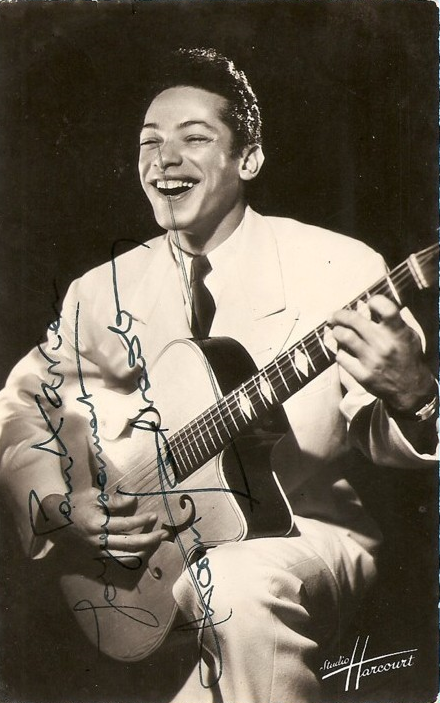
Henri Salvador
Instrument: None
Who is Henri Salvador?
Henri Gabriel Salvador, born on July 18, 1917, in Cayenne, French Guiana, was a renowned French singer, songwriter, and guitarist. He gained immense popularity in France and beyond during his career, which spanned several decades. He shared stage with Django Reinhardt and Oscar Alemán in “Battles of the guitar”. This fact (the meeting of Alemán with Django) was remembered by Duke Ellington´s cornetist Rex Stewart. He remembered an evening in a Pigalle Boite in 1939: “The air was electric, the champagne flowed, and the magic of the moment is firmly etched in my memory”.
Salvador was born into a musical family. His father, Clovis, was a composer and guitarist, and his mother, Antonine Paterne, was a singer. As a child, Salvador was exposed to different musical genres, including jazz, blues, and traditional Caribbean music, which would later influence his style.
In 1933, at the age of 16, Salvador moved to Paris, where he pursued a career as a guitarist. He joined the Hot Club de France, a famous jazz club, and played with some of the greatest jazz musicians of his time, including Django Reinhardt and Stéphane Grappelli. Salvador’s love for jazz and the guitar would become an integral part of his music, even as he branched out into other genres.
Salvador began his singing career in the 1940s, recording his first hit song “Maladie d’amour” in 1942. He went on to release several other successful singles, including “Le Loup, la Biche, et le Chevalier” and “Dans mon île,” which showcased his unique style, blending jazz, Caribbean rhythms, and French chanson.
He starred in several films such as Nous irons à Monte-Carlo (1950), Nous irons à Paris (1949), and Mademoiselle s’amuse (1948). In 1957, Salvador, using the name Henry Cording as a play on the word “Recording”, recorded the first French rock and roll songs, including “Rock’n Roll Mops”, “Rock hoquet, Va t’faire cuire un oeuf, man”, and “Dis-moi qu’tu m’aimes rock”, written by Boris Vian and Michel Legrand. Despite his historical significance in the genre, he claimed to dislike rock and roll and avoided discussing the subject.
During the 1960s, Salvador hosted several popular French TV variety shows. In 1964, he had a hit with “Zorro est arrivé”, an adaptation of The Coasters’ U.S. hit “Along Came Jones”. His distinctive, infectious laughter was a feature of many of his humorous songs. In 1969, Salvador recorded a version of Piero Umiliani’s “Mah Nà Mah Nà” with his own French lyrics, titled “Mais non, mais non” (“But No, But No” or “Of Course Not, Of Course Not”).
Salvador’s song “Dans mon île” (1957) was believed to have influenced Antônio Carlos Jobim in the creation of Brazilian bossa nova. Brazilian composer and singer Caetano Veloso made Henri Salvador famous in Brazil with his song “Reconvexo”, which includes the line “quem não sentiu o swing de Henri Salvador?” (“who hasn’t felt the swing of Henri Salvador?”). Veloso also recorded a version of Salvador’s “Dans mon île”.
Salvador’s music was characterized by his distinctive voice, which had a velvety quality, and his skillful guitar playing. His songs often had playful and humorous lyrics, and his performances were known for their energy and charisma. Salvador’s music appealed to a wide audience and became a symbol of the post-war era in France.
Salvador received numerous awards and accolades during his career, including the prestigious Grand Prix du Disque in 1958 and the Legion of Honor in 2005. He continued to perform until his death on February 13, 2008, at the age of 90.
Discography of Henri Salvador
Studio albums:
- Henri Salvador chante (1950)
- Henri Salvador (1952)
- Henri Salvador chante ses derniers succès (1953)
- Salvador s’amuse (1957)
- Le lion est mort ce soir (1962)
- Zorro est arrivé (1964)
- Henri Salvador (1965)
- Henri Salvador (1966)
- Monsieur Henri (1969)
- Chambre avec vue (2000)
- Révérence (2006)
Live albums:
- Salvador à l’Olympia (1959)
- Henri Salvador en public à l’Olympia (1964)
- Henri Salvador à Bobino (1974)
- Henri Salvador en public (1993)
- Henri Salvador au Palais des Sports (2005)
Compilation albums:
- Henri Salvador, vol. 1: Les années swing (1994)
- Henri Salvador, vol. 2: Les années chansons (1994)
- Henri Salvador, vol. 3: Les années chansons (1996)
- Les plus grands succès (2003)
- Best of Henri Salvador (2012)
Singles:
- “Clopin clopant” (1948)
- “Maladie d’amour” (1949)
- “Ma pipe” (1950)
- “Blouse du dentiste” (1950)
- “Le loup, la biche et le chevalier” (1950)
- “St. Louis Blues” (1952)
- “C’est le be-bop” (1952)
- “Rock and Roll-Mops” (1957)
- “Le travail c’est la santé” (1965)
- “Jardin d’hiver” (2000)
- “Syracuse” (2000)